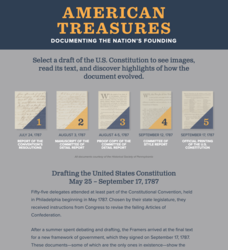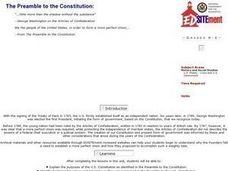Center for Civic Education
What Basic Ideas About Government Are Included in the Preamble to the Constitution?
Young historians explore the meaning of the Preamble to the US Constitution in this upper-elementary social studies lesson. Working with partners or in small groups, children discuss the purpose of government before reading and analyzing...
Curated OER
What is the Federal System Created by the Constitution?
Explore the unique structure of the federal system of government in the United States. Class members will learn about how most nations were organized before the establishment of the Constitution, how power is currently divided between...
Center for Civic Education
Historical Analysis of Constitutional Amendments
Each of the 27 Amendments to the U.S. Constitution were adopted within specific economic, political, social or cultural, and international contexts. As part of their Constitution Day/Week studies, seniors investigate these factors for...
Center for Civic Education
Matching Game with the US Constitution
In September we celebrate Constitution Day. Begin the celebration with a grand conversation about the US Constitution. Follow up the in-depth discussion with a learning game in which scholars match terms to images such as the...
Constitutional Rights Foundation
Naturalized Citizens and the Presidency
Article II, Section 1 of the U.S. Constitution takes center stage in a lesson that asks class members to assume the role of state senators, debate a resolution to amend the U. S. Constitution to permit naturalized citizens to run for...
Center for Civic Education
Orb and Effy Learn About Authority
Simplify the teaching of the US Constitution with this primary grade social studies activity. While reading a fun story about an imaginary place called Bubble Land, children learn about the concept of authority and the importance of...
Center for Civic Education
What Is Authority?
Young scholars examine the concepts of power and authority as they begin learning about government in this elementary social studies lesson plan. Through a series of readings, discussions, and problem solving activities, children...
Curated OER
Constitutional Convention Simulation
Why did the Founders make it so challenging to amend the US Constitution? To gain an understanding of why the process is so difficult, class members engage in a Constitutional Convention simulation. Groups draft, propose, and debate...
Florida Center for Reading Research
Fluency: Connected Text, Practice and Read
A reading activity boosts scholars' level of fluency while reading connected text. Working collaboratively, pairs read a word list three times and a specific text while their partner gauges their accuracy and speed.
National Constitution Center
American Treasures
Just how long did it take the framers to write the Constitution? What role did the drafting process play? Scholars examine various drafts from the Constitutional Convention to gain a better understanding of its formation. Interactive...
Curated OER
The Preamble to the Constitution
Students discuss key phrases from the Preamble of the Constitution, find ways to relate the values stated in the Preamble to their daily lives, and explore possible changes needed in the Constitution by future generations of citizens.
National Constitution Center
To Sign or Not to Sign: The Ultimate Constitution Day Lesson Plan
Students examine the ratification process. In this U.S. Constitution lesson plan, students discuss the ratification process and read a play based on the process. Students debate the ratification process and determine whether they...
Digital History
Slavery and the Slave Trade
What would it have been like to have heard the debate on the issue of slavery at the Constitutional Convention of 1787? With this resource, you are given the opportunity to read through a reconstruction of speeches on the topic with your...
National Constitution Center
Thirteenth Amendment Poster
President Lincoln believed in the Thirteenth Amendment so strongly that he signed 14 copies of it, but died before he could see it passed on December 18, 1965. Explore the text that forever abolished slavery in America with a document...
Curated OER
US Government: The Constitution
Students explore the branches of government. In this U. S. Constitution lesson, students examine the system of checks and balances in the U.S. plan of government as they read the document and define vocabulary words.
Curated OER
Children's Literature and the Bill of Rights
Young scholars read a variety of well-known studenT books and discuss concepts presented in the books as they relate to the Bill of Rights. They discuss the books and compare them to the Bill of Rights Amendments.
Curated OER
Grandpa' Fight and the U.S. Government
Students are given the United States Constitution, students generate a list on the board of Grandpa's constitutional rights that might help him keep his home and property. Students become "experts," by reading and group discussion, on...
Curated OER
How was the Constitution Used to Organize the New Government?
How did the United States Congress determine how the new president and vice president would be named when the nation was first established? Who would provide money for the government, and how would the executive branch be organized?
Curated OER
Rights of the Accused: To Be Confronted with the Witnesses Against Him
Students take on the role of Supreme Court Justices, after reading summary of a case and the arguments for and against a defendant's appeal. They make a decision, write majority and minority opinions, and report their decision.
Ashbrook Center at Ashland University
Bill of Rights
Do citizens need protection from the federal government? Scholars investigate why the framers of the Constitution created the first 10 amendments and what these amendments mean to citizens of the United States more than 200 years later....
University of California
Equal Rights? The Women's Movement from Suffrage to Schlafly
If you've never heard of the Equal Rights Amendment, it's probably because there isn't one in the United States Constitution. Delve into the contentious history behind the ERA, its founders and supporters, and reasons for its political...
Curated OER
We The People
Young scholars consider the main concepts of the Preamble of the United States Constitution They research different issues explored in the Constitution which have both historic and modern connections.
Curated OER
A More Perfect Union: Barack Obama's Race Speech at the National Constitution Center
Eleventh graders explore the process of perfecting the Union through changes made to the Constitution, and through the powers delegated to each branch of government. In this American Government lesson, 11th graders research various...
Center for Civic Education
To Amend or Not to Amend, That's Been the Question...Many Times
Looking for some ideas for how to celebrate September 17, Constitution Day? Check out a packet that focuses on the factors that are considered in the amendment process. Class members examine the amendment process and the types of...

























